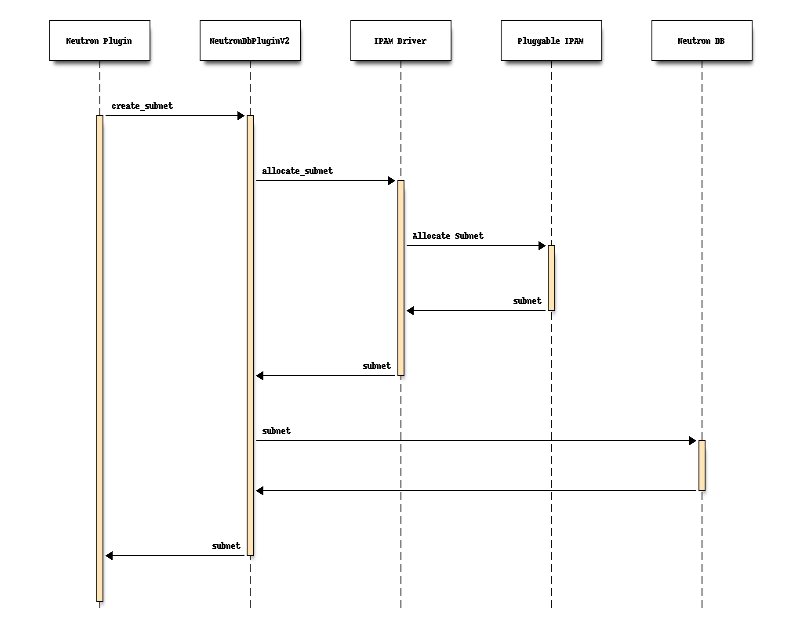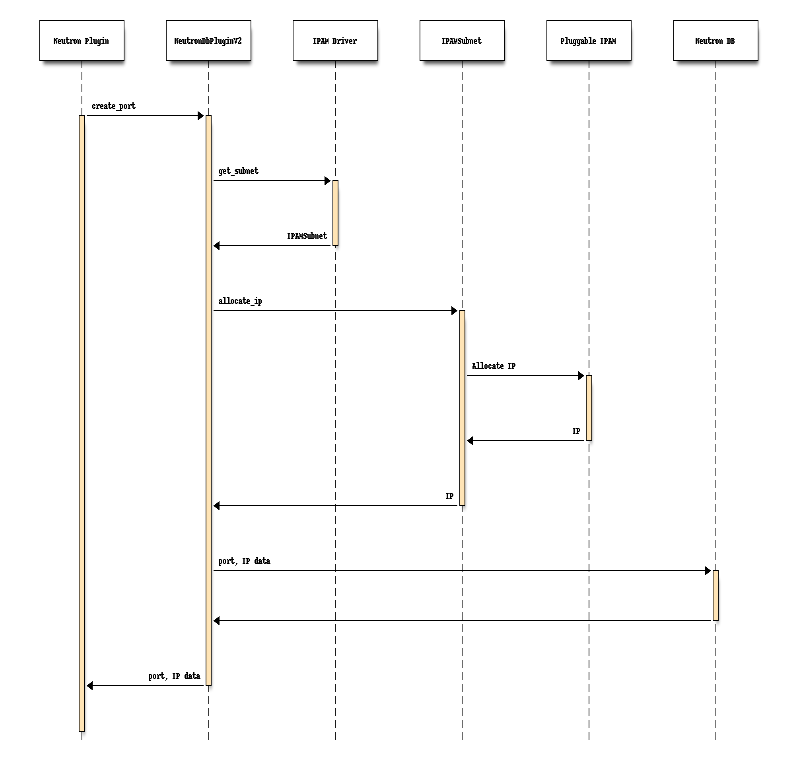Pluggable IPAM Subsystem in Neutron¶
Launchpad blueprint: https://blueprints.launchpad.net/neutron/+spec/neutron-ipam
This blueprint introduces the pluggable IPAM subsystem in Neutron that allows flexible control over the lifecycle of network resources like the following:
Fixed IP addresses assigned to Neutron ports
Floating IP addresses
Network address ranges, i.e. sub-networks
Problem Description¶
Users have a requirement to integrate OpenStack into their existing infrastructure that uses external IPAM.
Currently most (if not all) Neutron plugins leverage an IPAM implementation that is embedded in the db_base_plugin implementation. While this works well in a self-contained system, it makes it difficult or impossible to integrate with an external IPAM backend without terrible hacks.
The current architecture of Neutron does not allow users to implement their own IPAM mechanism in any other way other than introducing their own core plugin. That is, while the DHCP provider can be changed, the actual allocation logic cannot.
Proposed Change¶
Overview¶
The proposed change is the addition of a well-defined, abstract IPAM interface, and the refactoring of the existing NeutronDbPluginV2 to utilize that interface rather than directly perform IPAM actions on its own. A related blueprint [1] is proposed to implement a reference IPAM driver that captures the current behavior.
IPAM Interface¶
IPAM subsystem architecture overview is shown below. There is an abstract base class defined, IPAMDriver. There will be a reference implementation of this class - NeutronIPAM - that will encapsulate the current behavior. The IPAMDriver can be subclassed by third parties to implement different IPAM behaviors, such as different subnet or IP allocation strategies, or access to an external IPAM system.
The Neutron Plugins will call into the driver for IPAM functionality.
The driver interface will be synchronous.

The IPAM implementation will define abstract Request classes for subnets and addresses. These classes enable the caller to request subnet or IP allocations using criteria other than the explicit subnet or address, though implementation of request criteria other than the existing behavior is not within scope of this blueprint.
See [2] for the interface definition. The details of this interface are not part of this spec, and work on this interface may continue beyond approval of this spec.
Interaction Examples¶
An example interaction scenario between Neutron Plugins and IPAM are shown in the following diagram. In this diagram and the one that follows, “Pluggable IPAM” represents an optional external IPAM system. These diagrams are intended as examples; the specific details of each flow will be defined during implementation.

Here is another flow demonstrating the call to create a port. In this case, the IPAM driver is called in order to retrieve a subnet, or allocate the subnet if not found. That is, the “get_subnet” call may simply retrieve an existing subnet from the Neutron database, or it may go to an external IPAM system to query or allocate the subnet. The behavior is left to the discretion of the driver.
The IPAMSubnet object is used for the IP allocation.

Driver Creation¶
The IPAMDriver will contain a factory method to generate specific driver instances. There will be a driver instance per SubnetPool (see [3]). However, in this release only a single driver will be supported across the deployment.
https://blueprints.launchpad.net/neutron/+spec/subnet-allocation
Note that this BP will not provide any database or API for the SubnetPool. As part of this BP only a minimal implementation will be created.
The IPAM driver to use for a SubnetPool is specified through the configuration file /etc/neutron/neutron.conf. The default value will point to the reference NeutronIPAM driver.
Refactoring¶
The existing NeutronDbPluginV2 must be refactored to utilize the new IPAM interface. Several core plugins make calls to IPAM-related private methods in the NeutronDbPluginV2. Stub versions of those methods must be left in place and be refactored to utilize the IPAM interface, or the plugins must themselves be refactored to avoid calling private methods of the base class. The current implementation within those methods will be moved to the reference driver.
While the driver will enable an external IPAM system to provide the authoritative response on whether to allocate a new address or subnet, the Neutron database will still be required to have an accurate representation of the currently allocated subnets and IP addresses. Queries for existing allocations will still access the local database rather than call out through the driver. The synchronization of external IPAM and Neutron during initial migration and for ongoing verification purposes is the responsibility of the driver author, either within the driver or external to it.
The DB activities currently done in NeutronDbPluginV2 would better be handled via composition rather inheritance. The base plugin could have a database handler object that performs these functions. This would enable the database transaction to be performed outside (after) the addressing decision is made by the external system. This avoids a call involving I/O during an open transaction, which can lead to deadlock issues due to a MySQL connector flaw.
This goes beyond the IPAM functions, of course. The idea here being that all the plugins still need the core data in the Neutron DB even if they may need to store additonal data or perform additional actions during these calls.
Out-of-Scope Items¶
Several related functions have been discussed in relation to this blueprint.
DHCP options such as nameservers and host routes are intentionally de-coupled from the IPAM implementation. Pluggable DHCP would require a separate effort, or must be addressed within the individual drivers.
Similarly, integrations with Designate or other external DNS services during IPAM activities is out-of-scope.
IPAM Regional Internet Registries (RIRs) life-cycle management and automation is beyond the scope of this blueprint.
Data Model Impact¶
There will be no data model changes for this implementation, only the addition of interfaces and non-persistent classes. Rather, related data model updates are captured in [4], though this is not strictly required for this blueprint.
https://blueprints.launchpad.net/neutron/+spec/subnet-allocation
REST API Impact¶
None.
Security Impact¶
None.
Notifications Impact¶
None.
Other End User Impact¶
None.
Performance Impact¶
IPAM subsystem implementation of the default Neutron driver should have similar performance to the current Neutron IPAM. The performance impact of external IPAM drivers is beyond the scope of this document.
IPv6 Impact¶
Support for IPv6 is a requirement of this specification.
Other Deployer Impact¶
A new configuration option to specify the desired IPAM driver will be available in the neutron.conf file. If this value is not specified Neutron Server will fallback to the default Neutron IPAM driver in the default location. This choice was made to support backward compatibility with older neutron.conf files that do not have this option specified.
Developer Impact¶
By default the Neutron should work as it does today. Supplied reference IPAM driver should encapsulate current functionality.
As core plugins override several methods from the base plugin class, we will evaluate impact of the IPAM changes to those plugins.
Community Impact¶
This change was discussed at the Juno and Kilo Design summits. There was support for Pluggable IPAM, see link to the Etherpad in the Reference section of document.
Alternatives¶
None.
Developer Impact¶
Implementation¶
Assignee(s)¶
- Primary assignee:
John Belamaric (jbelamaric)
- Other contributors:
Salvatore Orlando (salvatore-orlando) Carl Baldwin (carl-baldwin) Ryan Tidwell (ryan-tidwell) Hosung Hwang (hhwang-2) Yue Ko (yko) Pavel Bondar (pasha117)
Work Items¶
Create IPAM abstract interfaces.
Create pluggable IPAM for db_base_plugin_v2.
Move all the IPAM-related functionality from db_base_plugin_v2 to the Neutron IPAM plugin.
Dependencies¶
Testing¶
The existing unit test will be used when appropriate and unit test coverage will be expanded to cover refactored Neutron IPAM code.
Functional Tests¶
Existing Functional Tests will be used when appropriate, refactoring of IPAM may require additional or refactored functional tests.
Tempest Tests¶
The existing Neutron Tempest tests will be utilized to test the default Neutron IPAM that will be developed.
API Tests¶
No change to API proposed.
Documentation Impact¶
User Documentation¶
Admin guide will be updated.
Developer Documentation¶
API guide will be updated.
